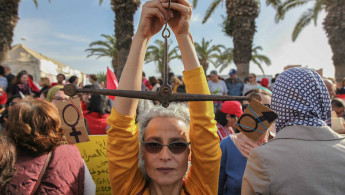Tunisian leader vows to enshrine inheritance equality in law
Tunisian President Beji Caid Essebsi said on Monday he plans to submit a bill to parliament soon aimed at giving women equal inheritance rights with men, against a backdrop of heated debate on the issue reverberating across the Muslim world.
In a speech marking Women's Day in Tunisia, Essebsi said he wants to submit the text "as soon as possible," probably when parliament sits again in October.
Essebsi's announcement comes after the publication of a report by Tunisia's Commission of Individual Liberties and Equality (COLIBE). The study proposes, among other things, the legalisation of homosexuality and making the sexes equal in inheritance matters.
Some progressives have been disappointed however that the COLIBE report has only initiated one legislative amendment, inheritance equality between men and women, so far.
Essebsi said that decriminalisting homosexuality and abolishing the death penalty - two other findings from the report - will be debated at a later date.
Tunisia's current system is based on Islamic Sharia law generally grants daughters only half the inheritance given to sons, and is standard practice in most Muslim countries.
Mainstream Muslim clerics see the inheritance rules as enshrined in the Quran, despite them being written many centuries ago.
Twitter Post
|
Thousands of conservative Muslim Tunisians took to the street to protest the findings of the report on Saturday.
The rally follows a similar demonstration earlier this month, when hundreds protested against proposed reforms of women's and LGBT rights.
Tunisia has long been seen as a pioneer for women's rights in the Arab world, but campaigners say the country is still torn between conservative and progressive camps.
In September, the government scrapped a law that prohibited Tunisian Muslim women from marrying non-Muslim men, a significant step in loosening the tight controls over women's life choices.
The government is also visibly taking steps to address the country's epidemic of gender-based violence, passing a landmark law in July which meant that rapists could no longer escape punishment by marrying their victims.
Similar laws were also passed in Lebanon, Morocco, Egypt and Jordan.
Agencies contributed to this report.
Follow us on Twitter: @The_NewArab





 Follow the Middle East's top stories in English at The New Arab on Google News
Follow the Middle East's top stories in English at The New Arab on Google News
![The UAE is widely suspected of arming the RSF militia [Getty]](/sites/default/files/styles/image_330x185/public/2024-11/GettyImages-472529908.jpg?h=69f2b9d0&itok=Yauw3YTG)
![Netanyahu furiously denounced the ICC [Getty]](/sites/default/files/styles/image_330x185/public/2024-11/GettyImages-2169352575.jpg?h=199d8c1f&itok=-vRiruf5)
![Both Hamas and the Palestinian Authority welcomed the ICC arrest warrants [Getty]](/sites/default/files/styles/image_330x185/public/2024-11/GettyImages-2178351173.jpg?h=199d8c1f&itok=TV858iVg)